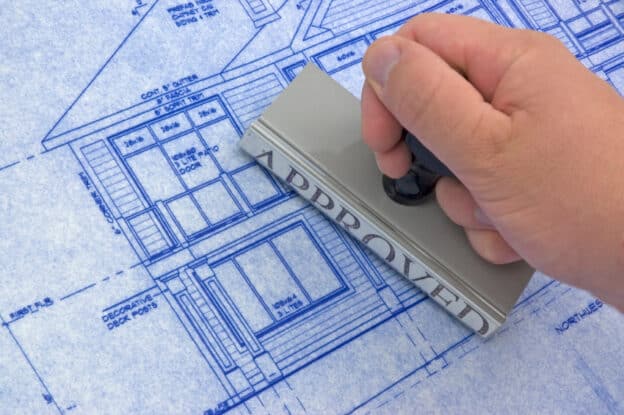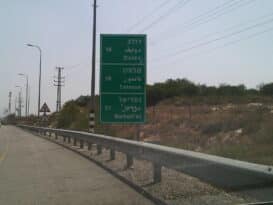Many foreign residents purchasing real estate in Israel are surprised by the prevalence of illegal extensions to the apartments they view prior to finding the property they will ultimately purchase. This phenomenon has its roots in many different factors, including the complicated and drawn out process for obtaining building rights and permits in Israel; the costs involved which can in certain circumstances be prohibitive and the various restrictions on the extent of construction imposed by local authorities.
Calculation and designation of area for construction:
To better understand the process of obtaining a building permit in Israel, it is instructive to first understand the basis for which the permitted amount of construction on any given plot of land is calculated:
All plots of land in Israel are subject to national and municipal zoning plans commonly known by their Hebrew acronym “Taba“. The Taba determines how a property may be developed and what limitations or restrictions are applicable. The extent to which a property may be developed is determined in percentage terms based on the size of the plot of land in question, or in Hebrew “achuzei bniyah“. The achuzei bniyah determines the quantity of building rights available for any piece of land. For example, if a plot of land is 1,000 square meters in size and the Taba grants achuzei bniyah of 75%, a person would be entitled to construct a total of 750 sqm. on that plot of land. The 750 sqm. in question would, generally, be divided into a number of apartments, each with a certain amount of area designated, as per the Taba, as “principal” or residential space (e.g. bedrooms, kitchen, living room) and the remaining area designated as “service” space (storage room). In certain cases, variances may be available to obtain additional building rights in specific circumstances.
One can find out what the Taba and achuzei bniya are for any given plot of land at the offices of the zoning and planning department of the relevant municipality.
The process for obtaining building permits in Israel:
In the event of a homeowner wanting to extend or modify his home, after verifying that building rights are available to add to the area previously built, an application can be made to the local planning committee for a building permit. Needless to say that the application and the architectural plans which form its’ foundation must comply with the provisions of the Taba. As a rule of thumb, internal renovations do not require a building permit unless they include changes to the exterior of the building (windows or doors) or redistribute the division between the residential and service space. A copy of the application must be delivered to the neighbors and other affected parties and they will be given an opportunity to have any objection heard by the local zoning and planning committee.
Construction may commence upon issuance of the building permit, which is generally subject to various conditions being fulfilled (including payments of taxes and fees to the local authority). Depending on the specific situation, certain municipal levies may also apply (hetel hashbacha) which could add significant expense to the overall construction budget and this should be carefully explored before a construction project or renovations are undertaken.
Upon completion of construction of a new apartment or building, the local authority will issue certificates confirming that construction has been undertaken per the permit issued (“Tofes 4“) and, thereafter, that construction has been completed (“Tofes 5″).
In this context, it is important to note that with certain exceptions, building rights are not customarily granted to specific apartments but rather to the entire property. Consequently, situations can arise in which a disproportionate amount of the building rights are used up by an owner of an apartment leaving little, if any, building rights remaining for the other apartment owners. It is interesting to note that even illegal construction (i.e. construction without a building permit) uses up achuzei bniyah and could prevent a person from obtaining a building permit even though he went to the trouble of applying for a permit as opposed to his neighbor who did not.
Changes in Taba:
As time passes and Taba plans are updated or replaced by the local authority or government, it may be possible to obtain additional building rights when none were previously available. Subsequently, applications may be filed to exploit these new rights to increase the size of existing apartments. Certain national zoning plans may enable individuals or all of the owners in a building to obtain building rights in consideration for them agreeing to reinforce their building against earthquakes. These are commonly referred to as Tama 38 projects.
The process of an individual applying to change the Taba and obtain new building rights can be quite complicated, expensive, and time-consuming. Depending on the city where the property is located, a time frame of 18 – 24 months is not considered unreasonable for passage of the plan, and success is not guaranteed. Consequently, it is advisable to have your architect consult with the municipality before filing to enquire as to the likelihood of the success of the application based on the current policies of the district and regional planning and zoning committees. During the course of the passage of the plan, your architect will remain in contact with the municipal and commission representatives as amendments are often required to the plans, whether as a result of objections filed by neighbors or other interested parties or by the various municipal departments themselves as they review the plan and condition their approval on certain changes being implemented to accommodate their requirements.
Illegal construction:
In many cases, purchasers looking to buy a pre-owned apartment discover that the owner or a previous owner has either added an extension to the apartment without a building permit or has perhaps converted service areas to residential space (e.g. by enclosing a service balcony off the kitchen into the kitchen itself). In these situations, inquiries should be made with an architect or surveyor to determine whether a building permit may be obtained retroactively to make the illegal area “kosher”. In some cases, this is a realistic possibility, either because it had been possible to do the work legally in the first place and the person who did the construction had simply decided to save the expense or because changes to the zoning rules (e.g. a new Taba) have now made it possible for the illegal change or addition to be legalized.
On the other hand, if it is determined that the illegal change or addition cannot be remedied, the situation becomes more complex. Though it is usually still possible to complete the purchase of the property and transfer title, the risk remains that the municipality may one day discover the illegal work, decide to enforce the building code, and demand that the apartment either be restored to its previous, legal condition or that a permit be obtained, if possible, for the illegal changes or additions. In this context, it is not a defense to show that the purchaser did not build the illegal addition or change himself, though this could serve as a basis for leniency by the court in determining what fine or other penalties to impose.
One of the main considerations for a purchaser of real estate in Israel in this context is whether the property is still attractive and whether the price is justified when factoring in the risk of the municipality requiring you to remove the illegal additions and changes and restore the property to its legal condition.
It is also worth noting for purchasers who are intending to finance the purchase with a mortgage, that the appraisers may not attribute any value at all to illegal additions to a property. This is due to the fact that the municipality may, at some point in time, require the addition to be demolished and the property restored to its legal condition.

Aryeh Rachlin is a partner in the Jerusalem law firm of Rachlin & Olman Law Offices. He has almost three decades of experience representing clients in real estate transactions in Israel. You can contact Aryeh by emailing him at [email protected].



